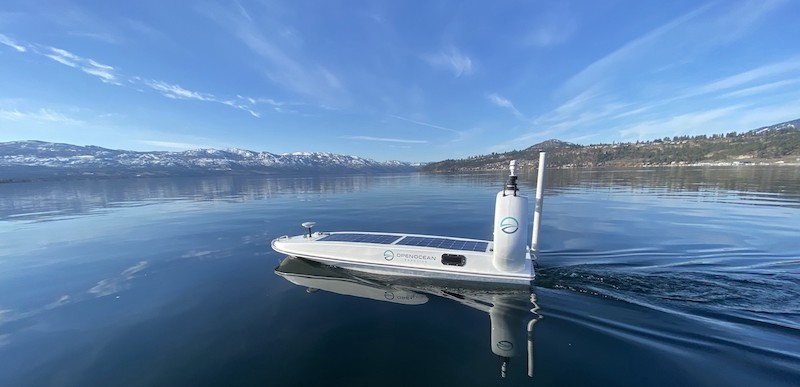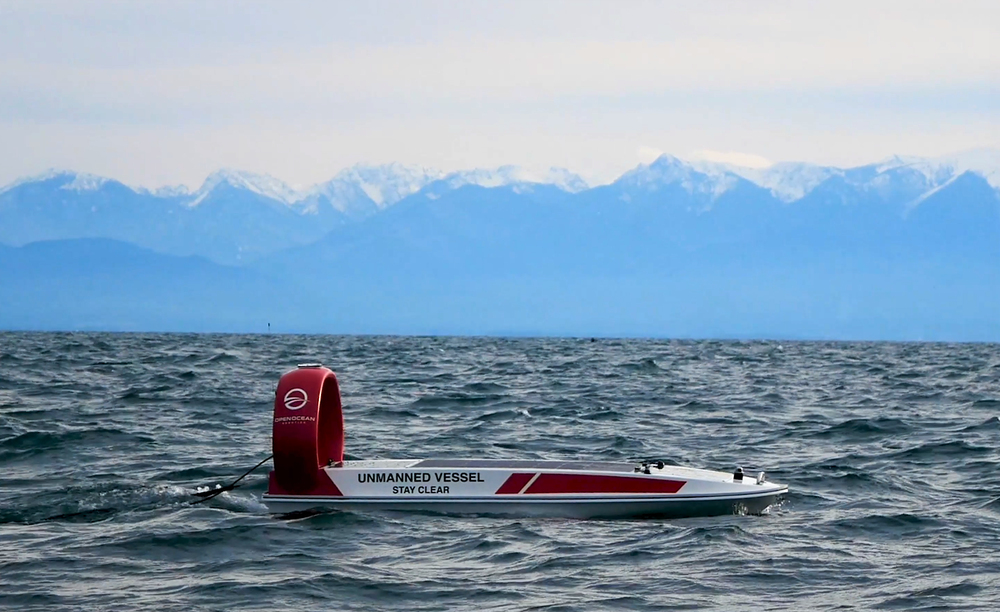
Open Ocean Robotics raises $4 million to develop autonomous boat
Open Ocean Robotics has completed a $4 million round of seed financing to advance its marine robotics and ocean data analytics platform.
This included a $2.8 million non-dilutive investment from Sustainable Development Technology Canada, an agency of the Canadian government, and $1.2 million from a syndicate of international investors including Rhiza Capital and Cindicates.
This funding enables the company to accelerate the development of its solar powered autonomous uncrewed surface vehicle technology and ocean data analytics platform for maritime monitoring.
Proposed applications of the vessel include patrolling waters against poaching and illegal fishing, as well as monitoring environmental pollution.
The company recently unveiled its partnership with Jasco Applied Sciences, with which it has demonstrated a “all-Canadian, marine mammal monitoring service” (pictured below).

John Moloney, Jasco’s engineering and business development manager, says: “Stakeholders and decision-makers who mitigate harm to marine mammals can now be enabled by real-time, actionable information wherever they are located ashore, in a truly cost-effective manner.
“Determining if that harm could have been avoided after an incident has occurred, simply isn’t good enough for these precious, threatened, and endangered animals.
“Scientists located in Dartmouth, Nova Scotia were able to verify real-time detections made aboard the USV near Victoria, British Columbia.”
Julie Angus, Open Ocean Robotics CEO, says: “We’re excited to showcase how Jasco and OOR’s innovative technologies can be combined to offer a safe, affordable, and sustainable way of protecting marine mammals.
“This has the potential to transform how oceans are monitored in Canada and around the world, and we’re proud to be a part of this much needed solution.”
Leah Lawrence, president and CEO of SDTC, says: “Access to better and timely data is essential for understanding and protecting the ecosystems that comprise our oceans.
“SDTC is proud to support Open Ocean Robotics in the development of their solar-powered, uncrewed surface vehicles.
“These emission-free vehicles offer decision makers the information they need as they look to conserve marine biodiversity and understand the impacts of climate change on oceans.
“As a graduate of SDTC’s Seed Fund, we are proud to continue our partnership with this Canadian cleantech company as they grow and take their operations to the next level.”
The seed funding will enable OOR to continue to find and develop new partnerships similar to the one with Jasco, and the company says its system is ready for operation.
Angus says: “We are delighted to have the support and recognition of SDTC and our investors for our technology to advance ocean monitoring.
“This will accelerate the development of our solar powered autonomous boats and real-time data analytics systems to help transform how we understand and protect our oceans.”
John Sutherland, CEO of Rhiza Capital, says: “We saw in Open Ocean Robotics an incredible opportunity to support an impact venture in British Columbia that had the potential and commitment to further a number of the Sustainable Development Goals both locally and internationally.
“Further, we believe that the technology developed by Open Ocean Robotics will go a long way in improving our ability to safeguard the health of our oceans, which are vital to the wellbeing and prosperity of coastal communities such as ours.
“We are delighted to be partners in their journey as they continue to refine and scale their ocean monitoring technologies for the betterment of the world.”
Open Ocean Robotics’ proprietary USVs collect ocean data using a suite of advanced sensors and AI processing for months at a time, in remote ocean regions and extreme sea states.
This ocean monitoring is used by industry, governments and researchers for illegal fishing enforcement, environmental monitoring, marine mammal monitoring and security applications.
Difficulties with current monitoring solutions lead to a range of environmental challenges which results in 30 percent of fish illegally caught every year costing $23 billion, marine mammal populations endangered by ship strikes and noise pollution, and fish stocks at the risk of collapse, jeopardizing our oceans and those who depend on it for sustenance.
OOR says its technology “will benefit the entire ocean ecosystem” through protecting marine mammal populations, fish stocks and the ecosystem, as well as reducing greenhouse gas emissions and other environmental risks from current monitoring solutions, which depend primarily on ships and aircrafts, by providing an emission-free monitoring solution.


